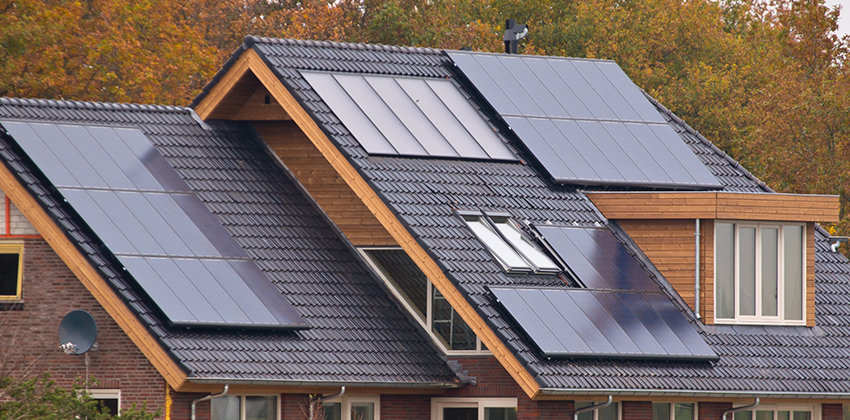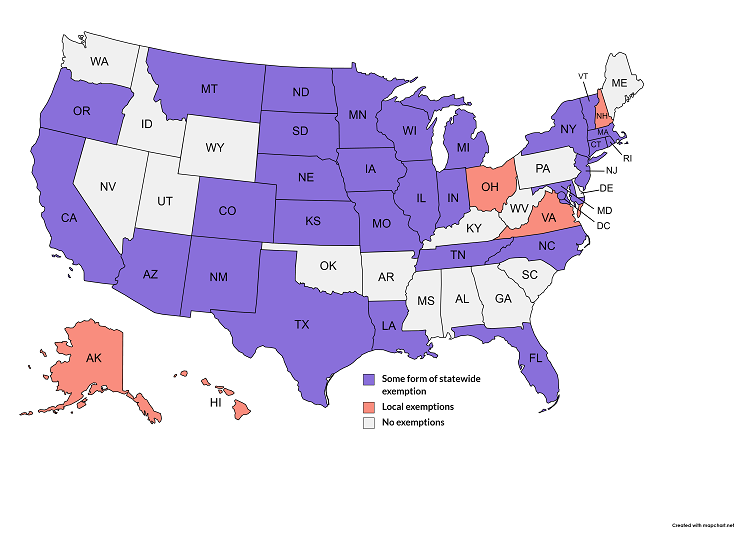See how much solar panels cost in your area

Please enter a valid zip code.
Zero Upfront Cost
Best Price Guaranteed
![]()
![]()
Solar Learning Center > The Pros and Cons of Rooftop Solar in 2025 > Increase Your Home Property Value
Increase Your Home Property Value

Do solar panels increase home value?
Energy savings and environmental benefits are often the two main reasons for going solar, but a sneaky third reason is that solar panels can increase your home value and help it sell faster.
In fact, studies by Zillow and the Lawrence Berkeley National Laboratory both found that homes with solar panels sell for more money than comparable homes without them. It’s really just a matter of how much.
In this article, we’ll cover just how much solar adds to your home value, how it affects your property taxes, and what to know about selling or buying a home with solar panels.
How much value does solar add to your home?
While every home is different, there are a few rules of thumb for how much solar panels increase your home value.
Zillow analyzed a year’s worth of home sales in 2018-2019 and found that homes with solar panels sold for 4.1% more on average than comparable homes without. That amounted to a $9,274 markup on the median home value when the study was conducted.
A 10-year study concluding in 2015 by the Lawrence Berkeley National Laboratory found that solar panels add around $4 per watt of capacity installed – or $4,000 per kW. Here’s how that adds up based on the size of your system:
| Solar system size | Increase to home value from solar panels* |
| 4 kW | $16,000 |
| 5 kW | $20,000 |
| 6 kW | $24,000 |
| 8 kW | $32,000 |
| 10 kW | $40,000 |
*Based $4,000 per kW installed per Lawrence Berkeley National Laboratory.
Things that affect the value solar adds to your home
Of course, the Zillow and Berkeley Lab figures are averages based on hundreds of thousands of home sales. The exact value that solar panels add to your home depends on a variety of factors, including:
- Location of your home
- Size of your solar energy system
- Age of your solar panels and inverter
- Efficiency conversion rate of your solar energy system
- Existing market value of your home
In general, the value added is roughly in line with the cost of the solar system and it changes over time.
But here’s the kicker: If you claim the full 30% federal tax credit, then you essentially pay for 70% of the solar system and still receive 100% of the value it adds to your home.
For example, say you purchase a 6 kW solar system for $24,000 and it adds $24,000 in value to your home. Your solar tax credit would be worth $7,200 bringing your net cost down to $16,800.
So you ended up paying $16,800 for something that added $24,000 in value to your home.
And, remember, added home value is just the secondary means of solar savings. The primary means is energy bill reduction, which can add up to hundreds of thousands of dollars over the life of a solar system.
Related reading: The Pros and Cons of Going Solar
Own your solar panels to add home value
The other thing to consider is that solar panels only increase your home value if you own them.
If you have a solar lease or Power Purchase Agreement (PPA), the solar panels don’t add value and can actually complicate the home sale.
While the ads for zero-down solar leases and PPA’s sound tempting, purchasing the system in cash or with a solar loan is often far more lucrative.
Will going solar raise my property taxes?
So if solar increases your home value, the obviously follow up question is if that will lead to higher property taxes. After all, your property taxes are based on your home value and tend to increase as your home appreciates.
The good news is that, as of October 2022, there is some form of property tax exemption for solar panels in 34 states plus the District of Columbia.

Solar property tax exemptions vary from state to state. Many apply to 100% of the system cost for the lifetime of the system while others are limited to 5, 10, or 20 years.
Look up your state or local tax code to get a better understanding of how solar panels will affect your property taxes.
This article does not constitute tax advice. Consult a tax professional for advice regarding solar property tax exemptions.
Selling a home with solar panels
As a long term investment, the longer you own your solar panels, the more money you can save. But life is full of surprises and you never know when you’ll need to pick up and move.
The great thing about solar panels is you can typically recover the cost of the system (and sometimes more) in the sale of your home. That’s because you’re basically selling the system to the homebuyer as part of the house — just like a new roof, updated flooring, or remodeled kitchen.
The other great thing is that solar panels attract buyers and help your home sell faster. This is especially important in 2022 with skyrocketing mortgage rates eroding the pool of homebuyers.
According to a 2021 report by Zillow, energy efficiency is becoming increasingly important among homebuyers.
| Year | Share of Buyers that Consider Energy Efficiency Very or Extremely Important |
| 2018 | 56% |
| 2019 | 56% |
| 2020 | 62% |
| 2021 | 67% |
Let’s take a look from the buyer’s perspective to see why solar panels are an attractive feature in a home.
Buying a home with solar panels
As we established above, homes with solar panels tend to be listed higher than comparable homes without them.
But here’s the important thing to remember: You’re buying a house without an electricity bill.
Based on the average household electricity consumption (10,632 kWh per year) and the average grid electricity price (16.7 cents per kWh), the average household spends $1,775 on electricity per year.
With a properly sized solar system, you pay zero.
And that’s just the first year. Grid electricity prices tend to rise over time, and have at an average rate of 3.51% per year since 2017. Based on typical utility rate increases, your annual savings would increase to:
- $1,837 in Year 2
- $1,901 in Year 3
- $1,968 in Year 4
Here’s what your cumulative electricity savings could look like if that trend continues:
| Year | Cumulative electricity savings |
| 1 | $1,775.00 |
| 2 | $3,612.30 |
| 3 | $5,514.09 |
| 4 | $7,482.64 |
| 5 | $9,520.28 |
| 10 | $20,832.85 |
| 15 | $34,275.12 |
| 20 | $50,248.05 |
For FHA homebuyers, seeking out an home with solar panels and other energy efficiency upgrades can help you qualify for a larger loan.
If you’re in the housing market, you’re probably already looking for a long-term investment. A house with solar panels is that in spades.
Plus, you can bypass the 3-5 month process of going solar and start generating clean electricity the day you get your keys!
Bottom line: Solar panels increase home values
To recap, it’s well documented that solar panels increase home values. Exactly how much value they add is up to debate, and depends on factors like location, condition of the panels, and the value of your home.
Homeowners typically recoup the cost of the solar systems in the sale of their home. In fact, since energy efficiency upgrades are becoming more popular among homebuyers, solar panels can help your home sell faster and for more money.
As a homebuyer, you can look at a house with solar panels as a house without an energy bill and an opportunity for long-term savings.
Related Articles
Going Solar in These Top 10 States Will Increase Your Home Property...
According to a recent report by Solar Energy Industries Association (SEIA), the U.S. installed 2.1 GW of solar capacity in Q2. The solar industry reached...
5 Home Improvement Tips for an Eco Home
Erase your visions of a sustainable home featuring twine countertops. No corn-husk flooring and garden-mud grout here. Eco-chic home design and sustainable architecture are on...
The Best Remodel to Increase Your Home’s Value
Home improvement can be a great financial investment, but it also carries a huge risk. Much of design, like countertops or carpeting, comes down to...
Apple’s New Campus Hosts the Country’s Largest Solar Commercial Project
Apple’s brand new headquarters is quickly approaching completion. The 175-acre campus is costing the tech giant an estimated $5 billion and will house roughly...
Atlanta Falcons vs. New England Patriots - The First Solar Super Bowl
The Super Bowl to change the energy game. Since Donald Trump has taken office, it seems that he is very up in the air on...
Solar: A High-Yield, Low-Risk Financial Instrument for Your Investment Portfolio
As the 2016 election cycle unfolds, political uncertainty is causing investors to reflect upon the real long-term threats to their own portfolios. It occurred to...
See how much solar panels cost in your area.

Please enter a valid zip code.

Please enter a valid zip code.
Zero Upfront Cost. Best Price Guaranteed.





